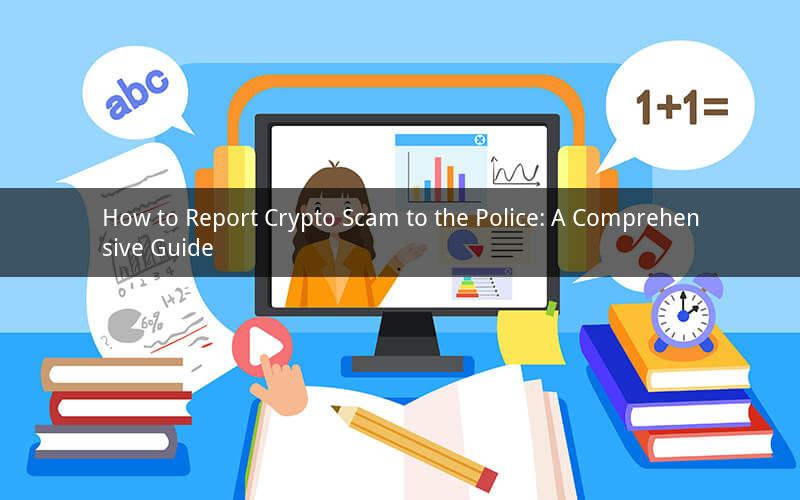
Introduction:
As the popularity of cryptocurrencies continues to rise, so does the occurrence of crypto scams. Falling victim to a crypto scam can be devastating, both financially and emotionally. It is crucial to report such incidents to the police to help prevent further scams and bring the culprits to justice. This article will provide a step-by-step guide on how to report a crypto scam to the police effectively.
1. Gather Evidence:
Before reporting a crypto scam to the police, it is essential to gather as much evidence as possible. This evidence will be crucial in building a strong case against the scammer. Here are some key pieces of evidence to collect:
a. Transaction records: Keep a record of all transactions involving the scammer, including the amount, date, and time of each transaction.
b. Communication logs: Save any emails, messages, or other forms of communication with the scammer. This includes screenshots, chats, and voice messages.
c. Website or platform information: Note down the website or platform where the scam took place, including any URLs or links involved.
d. Financial statements: Provide copies of your bank statements or cryptocurrency wallet transactions to show the financial impact of the scam.
2. Contact the Police:
Once you have gathered the necessary evidence, it is time to contact the police. Here are the steps to follow:
a. Identify the appropriate law enforcement agency: Determine the police department or agency responsible for handling crypto scams in your jurisdiction. This may vary depending on the nature of the scam and the location where it occurred.
b. File a report: Visit the police department or agency's website or call their non-emergency number to file a report. Be prepared to provide your personal information, the details of the scam, and any evidence you have collected.
c. Follow up: After filing the report, keep in touch with the police to ensure your case is being processed. Ask for a case number or reference number to track the progress of your report.
3. Provide Additional Information:
To strengthen your case, provide the police with any additional information they may request. This may include:
a. Identifying the scammer: If you have any information about the scammer's identity, such as their name, photo, or contact information, provide it to the police.
b. Previous victims: If you know of other victims of the same scam, inform the police and provide their contact information.
c. Expert testimony: If available, provide the police with expert testimony from cybersecurity professionals or other relevant experts who can help analyze the evidence and provide insights into the scam.
4. Be Prepared for Legal Action:
Reporting a crypto scam to the police is an essential step, but it is crucial to be prepared for potential legal action. Here are some points to consider:
a. Follow legal advice: Consult with a lawyer if necessary to understand your rights and legal options.
b. Cooperate with law enforcement: Provide any additional information or assistance the police may require during the investigation.
c. Stay informed: Keep yourself updated on the progress of the investigation and be prepared for potential legal proceedings.
5. Spread Awareness:
After reporting the scam to the police, it is essential to spread awareness to prevent future scams. Here are some ways to do so:
a. Share your experience: Share your story on social media, forums, and other platforms to warn others about the scam.
b. Educate others: Share information about common crypto scams and how to avoid them with friends, family, and colleagues.
c. Support anti-scam initiatives: Participate in or support organizations that work to combat crypto scams and raise awareness about the risks involved.
Conclusion:
Reporting a crypto scam to the police is a crucial step in bringing the culprits to justice and preventing future scams. By following this comprehensive guide, you can ensure that your report is thorough and effective. Remember to gather evidence, contact the appropriate law enforcement agency, provide additional information, be prepared for legal action, and spread awareness to help protect others from falling victim to crypto scams.
Questions and Answers:
1. What should I do if I am unable to gather sufficient evidence of a crypto scam?
Answer: If you are unable to gather sufficient evidence, consider seeking assistance from cybersecurity professionals or legal experts who may be able to help you recover the evidence or provide expert testimony.
2. Can I report a crypto scam if I am not the victim but know someone who was scammed?
Answer: Yes, you can report a crypto scam even if you are not the victim. If you know someone who was scammed, provide them with the necessary information and encourage them to report the scam to the police.
3. How long does it take for the police to investigate a crypto scam?
Answer: The duration of the investigation can vary depending on the complexity of the case and the availability of resources. It may take several weeks to months for the police to complete the investigation.
4. Can I recover my funds after reporting a crypto scam to the police?
Answer: Recovering funds after a crypto scam can be challenging, but it is not impossible. The police may work with financial institutions and cryptocurrency exchanges to trace and freeze the funds, but the recovery process may be lengthy and not always successful.
5. Should I report a crypto scam if I suspect it was committed by a known individual or organization?
Answer: Yes, you should report a crypto scam even if you suspect it was committed by a known individual or organization. The police will investigate the case and determine the appropriate legal actions to take. Providing all relevant information will help them in their investigation.